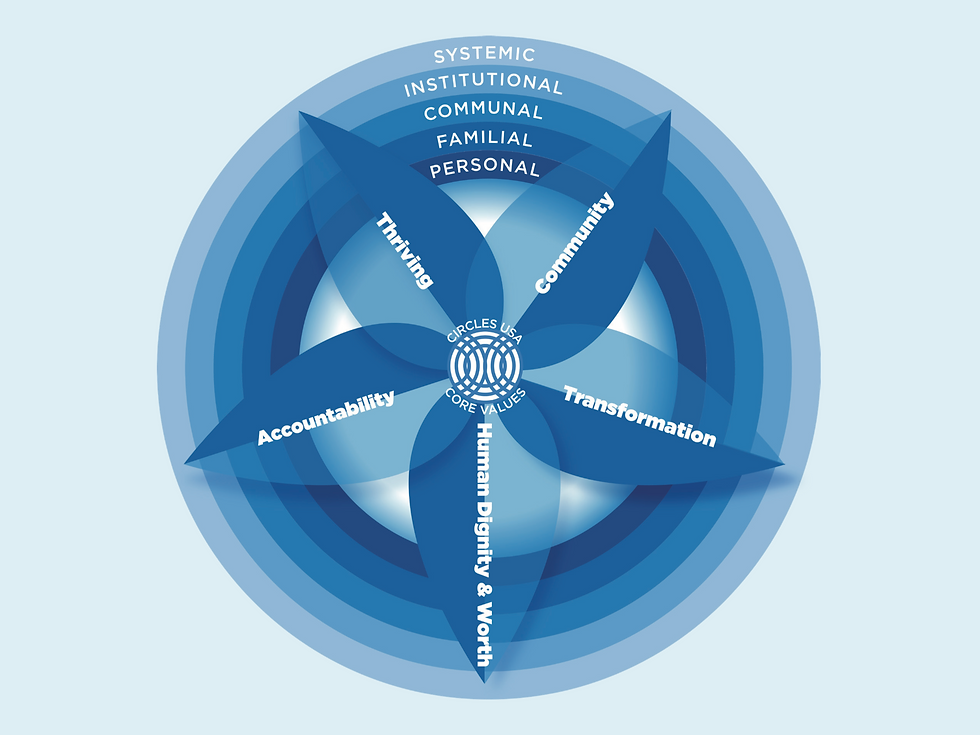Circles Honors Women’s History Month: Call to Action by Board Member Joan Kuriansky
- Mar 4, 2024
- 3 min read
Updated: Sep 22, 2024
Women’s History Month gives us the opportunity to celebrate the many women who have made history and those who are still in the process of making it.

Women who make history do so in a variety of ways, bearing many different life stories. History-making women were a force, for instance, at our 2023 Circles USA National Leadership Conference. Perhaps she was one of our keynote speakers, someone we met over lunch or in a workshop, discussing her personal strategies for moving out of poverty or those undertaken by the Big View Team in her chapter.
Talking with so many powerful, active Circle Leaders in Orlando reminded me of Gloria Steinem’s book Outrageous Acts and Everyday Rebellions. Moving out of poverty does take some extraordinary acts of nerve (and, yes, even rebellion) to defy “the feminization of poverty” that exists here and throughout the world. Dr. Diana Pearce, a colleague of mine at Wider Opportunities for Women, coined this now-ubiquitous phrase in 1978.
In her pioneering work, Dr. Pearce made clear that women are more likely to be poor than men. She recognized the structural forces that impede women’s ability to be financially secure and to create safe, healthy lives for ourselves and our families. Repeatedly, we see women relegated to low-paying service sector jobs, earning less than men doing comparable work. Women struggle disproportionately with the impact of domestic violence; we bear the physical, emotional, and economic tolls of caregiving for our children and aging or disabled family members. In the context of our ongoing COVID pandemic and resulting labor crises, economists have framed this phenomenon as the “Shecession.” Women represent the majority of low-wage workers and are the first to be laid off, the last to be rehired, and the least likely to qualify for unemployment insurance.
While these injustices are daunting, Women’s History Month reminds us that women with lived experiences of poverty can, and do, make outsized impacts on society—sometimes to the benefit of many, but always inspiring us with a vision of what is possible. Entertainers Oprah Winfrey and Dolly Parton have grappled with poverty; as have Civil Rights icons Fannie Lou Hamer and Rosa Parks (whose parents, although employed, could not afford to pay for Rosa’s needed medical surgery). Trailblazing Supreme Court Justice Sonia Sotomayor wrote about the impact of childhood poverty in her autobiography My Beloved World. Sarah Jessica Parker, celebrated for her role as Carrie on HBO’s Sex and the City, grew up in a family of nine kids whose parents often found themselves unable to pay a phone or electric bill.
One does not have to be a Supreme Court Justice or a Hollywood celebrity to make history. Women who are poor, who provide for themselves and their families, make choices every day that take courage. The 2020 Census revealed that more women experience poverty than men. For women of color—particularly Black, Indigenous, and Latino—the gap is even greater.
2024 is a pivotal year for women and their families living in poverty. This year’s local, state, and national elections will have a significant impact on women’s economic well-being and that of our families.
Please join Circles’ “Our Votes Count Campaign” as voters, leaders, and educators. Use our voices to speak up for quality jobs and demand that women have affirmative access to them, implement paid family and sick leave, increase availability of benefit programs, reduce the cliff benefit, and create universal health care and childcare. All of these policies have a disproportionate impact on women, particularly single moms, and women of color.
Let’s make history in 2024.

Joan A. Kuriansky, Current Chair of the Circles USA Board, has been on the Board since May 2007. She is the creator of our 6-point policy platform addressing six key issues our chapters flagged as high priorities to alleviate poverty. She has worked in the social justice field throughout her versatile career as an attorney; executive director of local and national non-profits; and board member or volunteer at local, national, and international levels. As Executive Director of Women Against Abuse (Phil. PA); the Older Women’s League (DC); and Wider Opportunities for Women (DC), Joan has addressed issues including social security, pension, and health care reform; violence against women; and many issues related to economic self-sufficiency for women, girls, and families. Joan draws on her Jewish and feminist values in supporting social justice and human rights, here, in the Middle East, Ukraine and other countries.




Comments